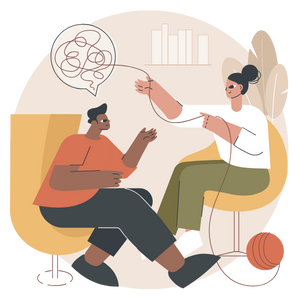Behavioral therapy is a type of psychotherapy that focuses on modifying problematic behaviors and thinking patterns. It’s a powerful therapeutic approach that has proven effective in treating a variety of mental health conditions and life challenges. In this blog, we’ll explore an overview of behavioral therapy, its benefits, and how it can be applied in different settings to treat various conditions.
Overview of Behavioral Therapy

Behavioral therapy is grounded in the belief that behavior can be learned and unlearned. The approach is rooted in the principles of learning theory, emphasizing the role of reinforcement and punishment in shaping behavior. Here are some key components of behavioral therapy:
- Observational Learning: Observational learning, also known as social learning, is a method in which individuals learn behaviors by watching others perform them.
- Classical Conditioning: This is a process where a neutral stimulus becomes associated with a particular response through repeated exposure. It’s often used in treating phobias and anxieties.
- Operant Conditioning: Operant conditioning involves using rewards and punishments to increase or decrease the likelihood of a behavior. For example, positive reinforcement encourages the continuation of desired behaviors.
- Cognitive Component: Although primarily focused on behavior, behavioral therapy often incorporates cognitive elements, helping individuals understand how their thoughts influence their actions.
Benefits of Behavioral Therapy
Behavioral therapy offers a range of benefits for individuals struggling with various challenges. Here are some key advantages:
- Effective for Various Conditions: Behavioral therapy is versatile and effective in treating a wide range of conditions, including anxiety disorders, depression, obsessive-compulsive disorder (OCD), post-traumatic stress disorder (PTSD), and addiction.
- Goal-Oriented: The therapy focuses on setting specific, measurable, and achievable goals for behavioral change. This helps individuals track their progress and stay motivated throughout the therapeutic process.
- Structured Approach: Behavioral therapy is a structured approach, with clear guidelines and strategies for addressing issues. This structure can make the therapy process more efficient and goal-driven.
- Empowers Individuals: By teaching individuals new skills and strategies for managing their behaviors, behavioral therapy empowers them to take control of their mental health and well-being.
- Short-Term: Behavioral therapy is often shorter in duration compared to other forms of therapy, such as psychoanalysis. This makes it a more accessible option for many individuals.
Applications of Behavioral Therapy in Treating Different Conditions

Behavioral therapy can be applied in a variety of ways to treat different conditions. Here are some common applications:
Anxiety Disorders
Behavioral therapy, particularly cognitive-behavioral therapy (CBT), is highly effective in treating anxiety disorders. Techniques such as exposure therapy help individuals confront and manage their fears in a controlled and safe environment. By gradually exposing themselves to anxiety-provoking situations, individuals can desensitize themselves and reduce their anxiety levels.
Depression
Behavioral therapy can also be beneficial for treating depression. It helps individuals identify negative thought patterns and behaviors that contribute to their depressive symptoms. By challenging and reframing these thoughts, individuals can develop healthier coping strategies and improve their mood.
Obsessive-Compulsive Disorder (OCD)
In treating OCD, exposure and response prevention (ERP), a type of behavioral therapy, is a common approach. It involves exposing individuals to their obsessions and helping them resist the urge to perform compulsive behaviors. Over time, this can reduce the intensity and frequency of obsessions and compulsions.
Post-Traumatic Stress Disorder (PTSD)
For individuals with PTSD, behavioral therapy can be a valuable treatment option. Techniques such as prolonged exposure therapy can help individuals confront traumatic memories and reduce their distress. By processing these memories in a safe and supportive environment, individuals can begin to heal from their trauma.
Addiction
Behavioral therapy is often used as part of a comprehensive treatment plan for addiction. It helps individuals identify triggers for their addictive behaviors and develop strategies for avoiding or coping with these triggers. Additionally, behavioral therapy can help individuals establish healthier habits and behaviors.
Eating Disorders
Behavioral therapy can be used to treat eating disorders such as anorexia nervosa, bulimia nervosa, and binge eating disorder. It helps individuals challenge distorted thoughts about food and body image while teaching them healthier eating patterns and coping strategies.
Attention-Deficit/Hyperactivity Disorder (ADHD)
Behavioral therapy is an effective treatment for children and adults with ADHD. It focuses on teaching individuals organizational and time-management skills, as well as techniques for improving focus and impulse control.
Conclusion
Behavioral therapy is a versatile and effective therapeutic approach that can be used to treat a wide range of conditions. Its focus on modifying problematic behaviors and thought patterns, along with its structured and goal-oriented approach, makes it a valuable option for individuals seeking to improve their mental health and well-being. Whether you are dealing with anxiety, depression, addiction, or any other mental health challenge, behavioral therapy can offer you the tools and strategies you need to lead a healthier, more fulfilling life.